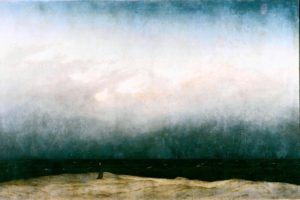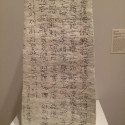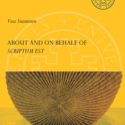
If you’re reading this, presumably you’re literate. We it for granted: being literate, seeing things and knowing what they say, reading for pleasure as much as for taking part in society. According to Walter Ong, being literate also influences the way we organize our thoughts and communicate, even orally. And we rarely question those conditions that most closely define us.
Kafka on the Shore, like most of Haruki Murakami‘s work, is a slipstream novel that melds fantasy and reality, wakefulness and dreaming. Being literate is one of the recurring themes of the book, but not one that has been much discussed. After all, there’s so much to this book: the Oedipus complex, selfhood, coming of age…
In the story, the main character, Kafka Tamura, loves books. On his fifteenth birthday, he runs away from home, and he ends up taking shelter at a library, where he spends his days reading. In stark contrast to Kafka is another character, Nakata, who suffered a mysterious accident as a child and now “is not very bright,” as he says, to the extent that he can no longer read. (But he can talk with cats.)
Nakata’s experience throughout the novel shows how hard it can be to get by in the world when you can’t read. As Nakata tells one of his cat companions, “In the human world if you can’t read or write you’re considered dumb.” Being illiterate in a literate person’s world extends far beyond simply not being able to read—which would be bad enough. (Take a look around you right now and see how many examples of written language you can see without moving.) But what’s more, literacy changes our speech, too. As Nakata says, “If you can’t read TV doesn’t make much sense. Sometimes I listen to the radio, but the words there are also too fast, and it tires me out.”
Later in the book, Kafka has his own brush with illiteracy. In a dreamlike state, Kafka finds himself in a mysterious room:
As I gaze at the vacant, birdless scene outside, I suddenly want to read a book—any book. As long as it’s shaped like a book and has printing, it’s fine by me. I just want to hold a book in my hands, turn the pages, scan the words with my eyes. Only one problem—there isn’t a book in sight. In fact, it’s like printing hasn’t been invented here. I quickly look around the room, and sure enough, there’s nothing at all with any writing on it.
Given how much writing permeates our culture, how much it’s become part of us, it must be very jarring indeed to suddenly find oneself in a place where there is no writing. In this alternate world, Kafka soon discovers that libraries are very different:
“The library?” She shakes her head.
“No… There’s a library far away, but not here.”
“There’s a library?”
“Yes, but there aren’t any books in it.”
“If there aren’t any books, then what is there?”
She tilts her head but doesn’t respond. Again my question’s taken a wrong turn and vanished.
“Have you ever been there?”
“A long time ago,” she says.
“But it’s not for reading books?” She nods. “There aren’t any books there.”
Soon enough, Kafka winds up in that library. And indeed, there is “not a book in sight.”
What we come to understand is that this is a world of direct experience, instead of one of conceptualizing things through the written word. Rather, as Kafka’s interlocutor explains:
The most important thing about life here is that people let themselves be absorbed into things. As long as you do that, there won’t be any problems. … It’s like when you’re in the forest, you become a seamless part of it. When you’re in the rain, you’re a part of the rain. When you’re in the morning, you’re a seamless part of the morning. When you’re with me, you become a part of me.
Here the line between text and being is blurred. And though we generally equate “fiction” with “fake,” the real world is quite like this, too.
It reminds me of the wonderful book by Yun Lee Too, The Idea of the Library in the Ancient World. This book challenges our assumption that books make a library; rather, the library primarily constitutes people working together in a certain way. For instance, Too describes how certain educated people in Antiquity were considered to be “breathing libraries.” That is, texts can be not only in the form of writing, but also in the form of people who embody them. In other words, these people have “let themselves be absorbed” into the books.
 Follow
Follow

